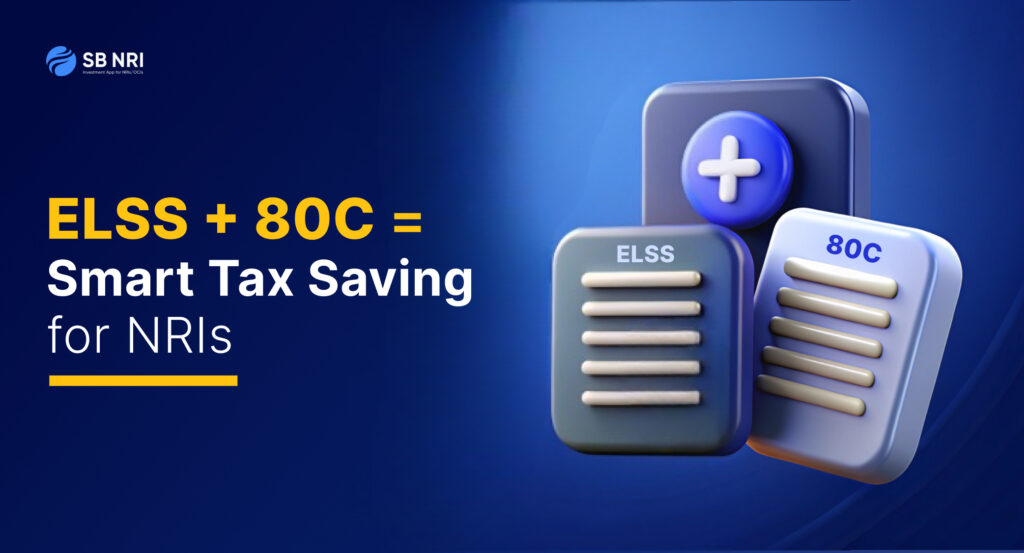
Want to Save Tax in India? Yes, Even NRIs Can Do It
If you’re an NRI earning rental income, capital gains, or any taxable income in India, chances are you’ve already dealt with TDS deductions. But did you know that you can claim deductions and save tax under Section 80C. Most NRIs are either unaware or unsure of what qualifies under this provision. This guide breaks it all down – what’s allowed, what’s not, and how you can make smarter financial decisions to reduce your Indian tax liability.
What is Section 80C?
Section 80C of the Income Tax Act allows individuals, including NRIs, to claim deductions on certain investments and expenses, up to a limit of ₹1.5 lakh per financial year. This deduction is only applicable to income earned or accrued in India, and the benefit is available only if you file your tax returns in India.
Who Can Claim 80C Deductions?
- You must be a Non-Resident Indian (NRI) earning income taxable in India—this includes salary earned in India, rent from Indian property, or capital gains from selling Indian assets.
- Deductions can be claimed only against income earned or accrued in India, regardless of where the income is received (NRO, NRE, or foreign accounts).
- You must file an Income Tax Return (ITR) in India to claim these deductions and potentially receive a refund on excess TDS.
Eligible Investments and Payments for NRIs Under Section 80C
Not every 80C option is open to NRIs. Here’s a list of what’s allowed or NRIs to save tax:
1. Life Insurance Premiums
- Policies must be in your name or your spouse/children’s name.
- Premium must not exceed 10% of the sum assured.
- Policy should be from an insurer registered with IRDAI in India.
2. Tuition Fees for Children
- Paid for full-time education in Indian institutions.
- Maximum of two children allowed.
- Includes school, play school, nursery, and college fees.
- Fees paid to foreign institutions do not qualify.
3. Principal Repayment on Home Loans
- For residential property in India only.
- Includes stamp duty and registration charges.
- Properties located outside India do not qualify.
4. Equity Linked Savings Scheme (ELSS)
- Tax-saving mutual funds with a 3-year lock-in.
- Offers market-linked returns with potential for high growth.

5. Unit Linked Insurance Plans (ULIPs)
- Combines life cover with market-linked investment.
- Offered by Indian insurers and qualifies under 80C.
6. National Pension System (NPS)
- Up to ₹1.5 lakh under 80C and an additional ₹50,000 under Section 80CCD(1B).
- Partial withdrawals at maturity are tax-free.
- Available to NRIs with Indian bank accounts.
7. NRO 80C Tax Saver Fixed Deposits
- 5-year lock-in.
- Must be in an NRO account, not NRE or foreign accounts.
What NRIs Cannot Claim Under Section 80C
There are a few popular schemes that NRIs are not allowed to invest in:
- Public Provident Fund (PPF): New NRI investments are barred.
- Senior Citizens Saving Scheme (SCSS): Open only to resident Indians.
- Sukanya Samriddhi Yojana: Restricted to resident account holders.
Related Tax-Saving Options Beyond 80C
While Section 80C offers a solid starting point, NRIs can also explore:
- Health Insurance Premiums (Section 80D): Up to ₹25,000 for self, spouse, and children. ₹50,000 if covering senior citizen parents.
- FCNR (B) Deposits: Tax-free interest income in foreign currency.
- Tax-Free Bonds and Government Securities: Some bonds offer stable income without TDS.
- Double Taxation Avoidance Agreement (DTAA): Useful to avoid being taxed twice on the same income.
Why Filing Returns is a Must for NRIs
Even if your income is fully taxed at source (TDS), filing an ITR is essential to:
- Claim 80C deductions and get a refund on excess TDS
- Comply with new rules under the Income Tax Bill 2025, which disallows nil TDS certificates but allows lower TDS certificates
- Show transparency and stay compliant if you plan to repatriate funds or invest more in India
Real Example: How 80C Can Save Tax
Raj, an NRI working in the UK, earns ₹4 lakh annually from his flat in Bengaluru. The tenant deducts 30% TDS (₹1.2 lakh) on rent. Raj invests ₹1.5 lakh in ELSS and ULIPs. By filing an ITR and claiming 80C, he brings down his taxable income to ₹2.5 lakh – below the basic exemption limit. He files his return and receives a full TDS refund of ₹1.2 lakh.
Final Word: Plan Now, Save Tax
If you’re an NRI paying taxes in India, Section 80C is not just a deduction – it’s an opportunity to take control of your finances, maximise returns, and reduce tax leakage. Choose eligible instruments wisely, keep documentation ready, and always file your return to save tax.
And if you’re unsure where to begin, connect with tax advisors who understand both Indian and NRI-specific regulations.

A little planning can go a long way in protecting your global income.
FAQs
Q. Can NRIs claim 80C if they earn only rental income in India?
Yes, NRIs earning taxable rental income in India can claim 80C deductions by filing an ITR.
Q. Are NRE fixed deposits eligible under Section 80C?
No, only NRO Tax Saver FDs with a 5-year lock-in qualify under 80C.
Q. Is investment in PPF allowed for NRIs?
No, NRIs are not allowed to make fresh contributions to PPF accounts.
Q. Do NRIs need to file ITR even if TDS is already deducted?
Yes, to claim deductions and refunds on excess TDS, filing is mandatory.
Q. Can NRIs invest in ELSS funds?
Yes, ELSS funds are one of the most preferred 80C options for NRIs, offering both tax benefits and equity exposure.



